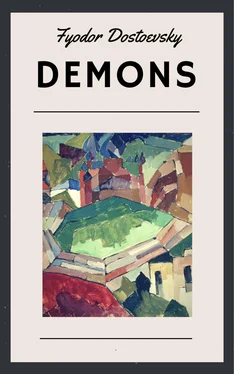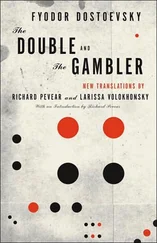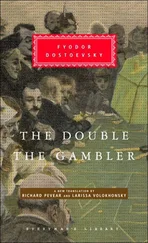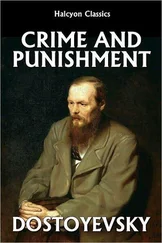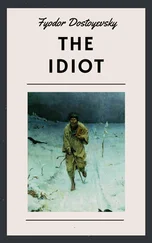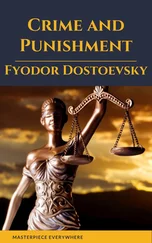I offered him a sip of water; I had never seen him like this before. All the while he was talking he kept running from one end of the room to the other, but he suddenly stood still before me in an extraordinary attitude.
“Can you suppose,” he began again with hysterical haughtiness, looking me up and down, “can you imagine that I, Stepan Verhovensky, cannot find in myself the moral strength to take my bag—my beggar’s bag—and laying it on my feeble shoulders to go out at the gate and vanish forever, when honour and the great principle of independence demand it! It’s not the first time that Stepan Verhovensky has had to repel despotism by moral force, even though it be the despotism of a crazy woman, that is, the most cruel and insulting despotism which can exist on earth, although you have, I fancy, forgotten yourself so much as to laugh at my phrase, my dear sir! Oh, you don’t believe that I can find the moral strength in myself to end my life as a tutor in a merchant’s family, or to die of hunger in a ditch! Answer me, answer at once; do you believe it, or don’t you believe it?”
But I was purposely silent. I even affected to hesitate to wound him by answering in the negative, but to be unable to answer affirmatively. In all this nervous excitement of his there was something which really did offend me, and not personally, oh, no! But … I will explain later on. He positively turned pale.
“Perhaps you are bored with me, G——v (this is my surname), and you would like … not to come and see me at all?” he said in that tone of pale composure which usually precedes some extraordinary outburst. I jumped up in alarm. At that moment Nastasya came in, and, without a word, handed Stepan Trofimovitch a piece of paper, on which something was written in pencil. He glanced at it and flung it to me. On the paper, in Varvara Petrovna’s hand three words were written: “Stay at home.”
Stepan Trofimovitch snatched up his hat and stick in silence and went quickly out of the room. Mechanically I followed him. Suddenly voices and sounds of rapid footsteps were heard in the passage. He stood still, as though thunder-struck.
“It’s Liputin; I am lost!” he whispered, clutching at my arm.
At the same instant Liputin walked into the room.
IV
Why he should be lost owing to Liputin I did not know, and indeed I did not attach much significance to the words; I put it all down to his nerves. His terror, however, was remarkable, and I made up my mind to keep a careful watch on him.
The very appearance of Liputin as he came in assured us that he had on this occasion a special right to come in, in spite of the prohibition. He brought with him an unknown gentleman, who must have been a new arrival in the town. In reply to the senseless stare of my petrified friend, he called out immediately in a loud voice:
“I’m bringing you a visitor, a special one! I make bold to intrude on your solitude. Mr. Kirillov, a very distinguished civil engineer. And what’s more he knows your son, the much esteemed Pyotr Stepanovitch, very intimately; and he has a message from him. He’s only just arrived.”
“The message is your own addition,” the visitor observed curtly. “There’s no message at all. But I certainly do know Verhovensky. I left him in the X. province, ten days ahead of us.”
Stepan Trofimovitch mechanically offered his hand and motioned him to sit down. He looked at me, he looked at Liputin, and then as though suddenly recollecting himself sat down himself, though he still kept his hat and stick in his hands without being aware of it.
“Bah, but you were going out yourself! I was told that you were quite knocked up with work.”
“Yes, I’m ill, and you see, I meant to go for a walk, I …” Stepan Trofimovitch checked himself, quickly flung his hat and stick on the sofa and—turned crimson.
Meantime, I was hurriedly examining the visitor. He was a young man, about twenty-seven, decently dressed, well made, slender and dark, with a pale, rather muddy-coloured face and black lustreless eyes. He seemed rather thoughtful and absent-minded, spoke jerkily and ungrammatically, transposing words in rather a strange way, and getting muddled if he attempted a sentence of any length. Liputin was perfectly aware of Stepan Trofimovitch’s alarm, and was obviously pleased at it. He sat down in a wicker chair which he dragged almost into the middle of the room, so as to be at an equal distance between his host and the visitor, who had installed themselves on sofas on opposite sides of the room. His sharp eyes darted inquisitively from one corner of the room to another.
“It’s.… a long while since I’ve seen Petrusha.… You met abroad?” Stepan Trofimovitch managed to mutter to the visitor.
“Both here and abroad.”
“Alexey Nilitch has only just returned himself after living four years abroad,” put in Liputin. “He has been travelling to perfect himself in his speciality and has come to us because he has good reasons to expect a job on the building of our railway bridge, and he’s now waiting for an answer about it. He knows the Drozdovs and Lizaveta Nikolaevna, through Pyotr Stepanovitch.”
The engineer sat, as it were, with a ruffled air, and listened with awkward impatience. It seemed to me that he was angry about something.
“He knows Nikolay Vsyevolodovitch too.”
“Do you know Nikolay Vsyevolodovitch?” inquired Stepan Trofimovitch.
“I know him too.”
“It’s … it’s a very long time since I’ve seen Petrusha, and … I feel I have so little right to call myself a father … c’est le mot; I … how did you leave him?”
“Oh, yes, I left him … he comes himself,” replied Mr. Kirillov, in haste to be rid of the question again. He certainly was angry.
“He’s coming! At last I … you see, it’s very long since I’ve seen Petrusha!” Stepan Trofimovitch could not get away from this phrase. “Now I expect my poor boy to whom … to whom I have been so much to blame! That is, I mean to say, when I left him in Petersburg, I … in short, I looked on him as a nonentity, quelque chose dans ce genre. He was a very nervous boy, you know, emotional, and … very timid. When he said his prayers going to bed he used to bow down to the ground, and make the sign of the cross on his pillow that he might not die in the night.… Je m’en souviens. Enfin, no artistic feeling whatever, not a sign of anything higher, of anything fundamental, no embryo of a future ideal … c’était comme un petit idiot, but I’m afraid I am incoherent; excuse me … you came upon me …”
“You say seriously that he crossed his pillow?” the engineer asked suddenly with marked curiosity.
“Yes, he used to …”
“All right. I just asked. Go on.”
Stepan Trofimovitch looked interrogatively at Liputin.
“I’m very grateful to you for your visit. But I must confess I’m … not in a condition … just now … But allow me to ask where you are lodging.”
“At Filipov’s, in Bogoyavlensky Street.”
“Ach, that’s where Shatov lives,” I observed involuntarily.
“Just so, in the very same house,” cried Liputin, “only Shatov lodges above, in the attic, while he’s down below, at Captain Lebyadkin’s. He knows Shatov too, and he knows Shatov’s wife. He was very intimate with her, abroad.”
“ Comment! Do you really know anything about that unhappy marriage de ce pauvre ami and that woman,” cried Stepan Trofimovitch, carried away by sudden feeling. “You are the first man I’ve met who has known her personally; and if only …”
“What nonsense!” the engineer snapped out, flushing all over. “How you add to things, Liputin! I’ve not seen Shatov’s wife; I’ve only once seen her in the distance and not at all close.… I know Shatov. Why do you add things of all sorts?”
Читать дальше
